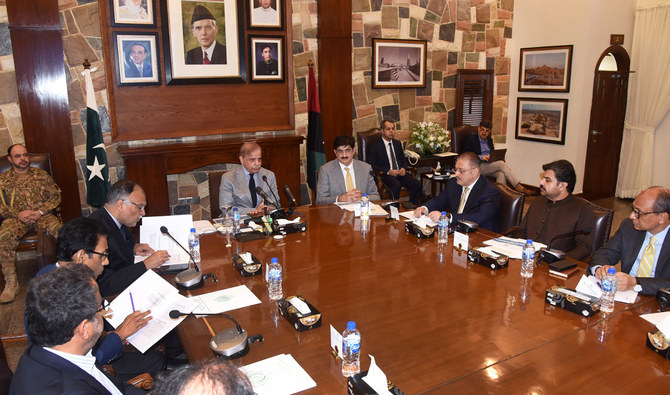KARACHI: Prime Minister Shehbaz Sharif on Wednesday called for unity to overcome Pakistan’s economic challenges, as he arrived in the southern port city of Karachi on his maiden trip to the metropolis since assuming the country’s top political office.
Sharif held meetings with Sindh Chief Minister Syed Murad Ali Shah and the province’s governor, Kamran Tessori, after arriving in the city. The two sides discussed administrative and financial matters concerning the province.
Flanked by the two officials, the prime minister later spoke to a delegation of Karachi’s prominent businesspersons, referring to them as “the backbone of Pakistan’s economy.”
“We should rise before our personal likes and dislikes and work together to serve the country,” he told the business delegation. Sharif added he wanted to carve out the best business policies for Pakistan to improve the country’s financial health.
Sharif noted Pakistan’s stock market was performing well with each passing day, highlighting that the country’s economic outlook was improving as was evident from its surging IT exports and positive current account.
“I think we should avail this opportunity [for economic stability] completely,” he said. “And the only way to do that is to meet the business community’s legitimate demands. And our focus should be on export-led growth.”
Sharif assured the business community that privatization of state-owned entities (SOEs) would be done in the most transparent manner possible.
“It would be done free of any obstacle or bureaucratic delay,” he said, adding that billions of rupees annually were being wasted due to loss-making SOEs.
“It is not the job of the government to run the industry, the government’s job is to give only policy and act as a catalyst,” he said. “I believe in this and so does my team. You should move forward, sky is the limit.”
During the interaction, Pakistani business tycoon Arif Habib appreciated Sharif for securing Pakistan’s bailout package with the International Monetary Fund (IMF) last year, which helped the country avoid a sovereign default.
Habib also urged the prime minister to mend Pakistan’s ties with India and extend an olive branch to former prime minister Imran Khan, his political nemesis.
SINDH’S OUTSTANDING DUES
Earlier in his meeting with the Sindh chief minister, Sharif was informed about financial matters between the province and the center.
The chief minister’s spokesperson informed Sharif that the center owed Sindh a whopping Rs1,078.198 billion yet it had handed over Rs28 billion less than that.
“The prime minister instructed the federal finance minister to speak to the chief minister and resolve financial matters,” the chief minister said.
Sharif later announced the addition of 150 buses in Karachi to a fleet of 300, which the provincial government aims to deploy to alleviate the people’s transport woes.
“On the insistence of transport minister, Sharjeel Inaam Memon, prime minister announced 150 buses in the pool of 300 buses,” Abdul Rasheed Channa, the Chief Minister’s House spokesperson said, adding that the prime minister praised the provincial transport department.
Karachi, one of the largest cities in the world with a population of 20.3 million people, has 25,000 buses operating on over 700 routes covering the city. The number of private buses has decreased to 300 which operate on only 50 routes.















